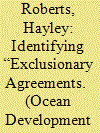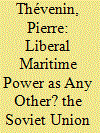| Srl | Item |
| 1 |
ID:
178353


|
|
|
|
|
| Summary/Abstract |
To date, marine genetic resources (MGR) have proven to be the most controversial aspect of the package deal structure of the ongoing negotiations of a legally binding instrument for the conservation and sustainable use of biodiversity beyond national jurisdiction (BBNJ). This has led to a proliferation of scholarly work characterizing the debate on MGR along developed and developing state lines. By applying middle power international relations theory to the Australian delegation’s conduct in MGR negotiations, this article aims to challenge the developed/developing state narrative. As such, it advocates a more nuanced approach to understanding state motivation in multilateral treaty negotiations pertaining especially to complex issues such as MGR.
|
|
|
|
|
|
|
|
|
|
|
|
|
|
|
|
| 2 |
ID:
178352


|
|
|
|
|
| Summary/Abstract |
The United Nations Convention on the Law of the Sea (UNCLOS) is heralded as a constitution for the oceans and, as part of this, provides for a compulsory dispute settlement procedure entailing binding decisions. However, case law and academic commentary have highlighted significant issues in definitively identifying other agreements that could preclude these compulsory procedures—a concept permitted by the Convention in certain circumstances. This article begins to explore this challenge by contending that the type of agreement plays a significant role in whether or not it could be determined to be an “exclusionary agreement.” In doing so, the article conducts a systematic interpretation of Articles 281 and 282 UNCLOS, underpinned by the application of relevant provisions in the Vienna Convention on the Law of Treaties. This provides a conclusive basis as to whether the status of an agreement as an “ad hoc agreement” (specific; adopted for the dispute) or an “existing agreement” (general; adopted prior to the dispute) holds any significance in the context of these articles.
|
|
|
|
|
|
|
|
|
|
|
|
|
|
|
|
| 3 |
ID:
178355


|
|
|
|
|
| Summary/Abstract |
Fish aggregating devices (FADs) are widely used in artisanal fisheries in the Mediterranean Sea and in tropical tuna fisheries. Thousands of FADs are lost or abandoned each year, with many causing environmental damage. This article examines whether such loss or abandonment contravenes international marine pollution law. It finds that abandonment probably constitutes “dumping” within the meaning of the international dumping regime and thus, depending on the material of which a FAD is made, is either prohibited or subject to a permit system, and that the nonaccidental loss of a FAD breaches Annex V of MARPOL. The article also considers what action may be taken against the flag states of vessels that have abandoned or lost FADs.
|
|
|
|
|
|
|
|
|
|
|
|
|
|
|
|
| 4 |
ID:
178356


|
|
|
|
|
| Summary/Abstract |
This article examines the role played by the Soviet Union during the negotiations of the United Nations Convention on the Law of the Sea. The author argues that since its transformation into a maritime power in the 1960s, the USSR defended a liberal conception of the law of the sea, similar to that promoted by the West with which it cooperated in order to resist attempts by developing states to increase coastal state sovereignty on the high seas and centralize exploitation of the deep seabed’s resources. To demonstrate its thesis and reassess the findings of the existing literature, this article draws upon the travaux préparatoires of the Law of the Sea Convention, as well as newly available fonds from the French Diplomatic archives.
|
|
|
|
|
|
|
|
|
|
|
|
|
|
|
|
| 5 |
ID:
178350


|
|
|
|
|
| Summary/Abstract |
The physical security of submarine cables is under multiple sources of threats from private activities, but the law of the sea does not provide sufficient jurisdiction for the coastal state to regulate these threats. International investment law, however, provides cable investors with the possibility of invoking the full protection and security (FPS) standard against the cable-landing state in international arbitration. This standard requires the cable-landing state to take all reasonable measures to protect the physical security of submarine cables from physical damage, but its application is subject to some limits.
|
|
|
|
|
|
|
|
|
|
|
|
|
|
|
|